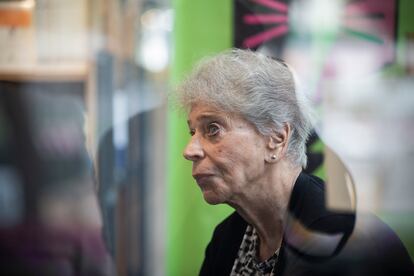Writer Vivian Gornick: ‘when feminism came along, it explained us to ourselves…. And what would have happened to me [if it hadn’t]?’
The New Yorker disabuses us of the commonplaces of marriage and romantic love as portrayed in literature


Vivian Gornick is experiencing one of those strange phenomena that sometimes happens in literature and in life: explosive recognition at a late age, especially with the Spanish-speaking public. She believes that MeToo and a new sensibility have made young women look to her generation, where they find models like The End of the Novel of Love, Gornick’s work from 1990s in which she dismantled literature’s excessive faith in the couple. Deeply feminist, the 87-year-old New Yorker jettisons the commonplaces of love. We talked to her about these topics via Zoom.
Question: Is love as we knew it over?
Answer. You know, what I said is always mistaken for my saying It’s the end of love, it’s the end of marriage, it’s the end of this or that. That is not what I am saying. I am saying that it is impossible now to make great literature out of the idea of romantic love… That once upon a time, romantic love was seen as a great metaphor for the human condition...Now, it is not that way. It’s not experienced that way anymore. And it was experienced that way when people were very innocent, when there was no divorce, when decisions were taken [in ignorance and] used for…shields…I mean, just imagine an Anna Karenina being written today, or Emma Bovary, or any of the great novels [that] turn on the glory and the sadness of romantic love… In my opinion…you cannot make a great work out of that anymore, because we all have too much experience…We all know that romantic love is not the salvation of our struggles and lives,
Q. What do you believe love’s role in life is?
A. I believe love is a great necessity, as is work. I believe love…loving in a million ways is one of the great ways to feel alive.. And I believe in work in the same way, if not more. Those are the two great elements that make a life. As Freud said, life is work [and] love in that order, not the other [way around].
Q. Has marriage, as a model of happiness, also ended?
A. I say yes. Yes…Everyone gets married knowing they can get divorced... I don’t think anybody thinks marriage is sacred anymore.
Q. How did you experience it?
A. Well, I remember a time when divorce was unthinkable. When I grew up in a working-class immigrant district in the Bronx…The buildings were filled with unhappy marriages, and nobody dreamed of leaving anybody. I’m tired of [fantasies of] what life could be if [a woman] only found the right man…. That’s how I grew up. And that’s a great deal of what marriage exposed to me. My own parents were very much in love, and they imparted to us another kind of a myth. My mother subscribed to the idea of one great love, which she had with my father, but it didn’t make me happy…She kept telling me love was the most important thing in a woman’s life. And my father died young. We were all fairly young. I mean, we were children. And my mother was in her mid-40s…It was an incredible disaster, from which I don’t think anybody ever recovered. But I did not want to replicate that… So, I always had a lot of mixed feelings about elevating love [to] such [an important] position… No, I could never believe that.
Q. And what was your own idea of independence?
A. I always imagined myself [as] a writer as a child. I was eight years old [when] a teacher held up [a] composition of mine to the class and said, ‘This little girl is a writer.’
Q. What happened next?
A. I was always writing… little compositions, little stories, impressions here and there. Then when I was 16, my mother got me a typewriter…So, that showed that she had some faith in me…You know, when I was in college, I took writing courses, and again, I was told I was a writer, but I was like most women, I was very neurotic about work….I could not make myself do it…It was feminism that set me on the course for making myself a serious worker. Recognizing the fact that…certain things are required of you if you are going to be a serious worker. And one of them was discipline, sitting down to it every day.
Q. Feminism helped you then?
A. It made me see that… I was born into a sex that was not taken seriously and it did not take itself seriously. It made me see that I had never taken myself seriously, that…I drifted along, getting married twice. Both times briefly, just a couple of years because I was so restless and unhappy…And I realized that almost every woman I knew was in the same position…Once feminism struck in New York City, it was very full, fully articulated, fully mature…Many women like myself, we were educated, we were in television and we …were aimless. We had no context in which to take ourselves seriously. Nobody expected anything of us except to get married and have children…I wasn’t happy with that…Marriage and children, sex, love, men. Somehow or other, all of that was on a back burner to me. I don’t know why…And, you know, when feminism came along, it explained us to ourselves…. And what would have happened to me [if it hadn’t]?
Q. Are women taken seriously today?
A. Well, listen, it’s a centuries long struggle to achieve equality…I think that we have made astonishing strides in the last 40 years…[And] you and I wouldn’t be here today if it wasn’t for the women’s movement. I think it has made astonishing advances. But nowhere near enough. [Spain] is a good example of that. You know, it’s sort of halfway there, but not really…You still have millions of women who are joined at the hip to their husbands…and can’t just find a way to think of themselves as equal participants in the world enterprise…
Q. What are today’s fantasies?
A. That’s a hard question to answer. I don’t know. I really don’t know. I think we’re living in a very fractured time…There is no commonality in the culture, and therefore, it’s very difficult now for people to know themselves--who they are, what they want, and why…[There] was a time when there were many institutional choices that told you who you are. Religion, family... [But] they don’t anymore. That doesn’t mean they have a better place to go to... Many, many people…young women whom I know in New York, and there’s thousands of them, are full of energy, vitality. They’re very new. And when they’re politically minded, they’re very active, very active on behalf of rights, but also on behalf of all the major issues of the time: immigrants, racism, all the things that bedevil us in America… When they write novels, they are stories of disconnect.
Q. What does reading offer you?
A. I find comfort in the long, ongoing record of anything that reading gives me…I see what makes up human beings going back centuries….: the affection, the intelligence, the hungers, longings, motives, the inability to…find [oneself], all these things that make me feel alive…[For example,] if you read Marcus Aurelius, you’re reading a modern reading, a man [is] telling you [that] anger steals your life, you hate…he knew it all. And I take great comfort in [that].
Q. And what has writing done for you?
A. Writing is the thing that makes me feel most alive. Why? Who cares? That’s an unanswerable question…But… it is all the experiences [over] all the years. It’s only when I’m actually writing...When I actually get something on the page, a piece of writing that I feel. When I’ve written a sentence that feels absolutely right, I experience joy, and I feel alive, and I feel safe. Nothing can hurt me…nothing at all.
Q. What do readers give you?
A. I don’t know. Well, I do know. It’s the MeToo movement… Feminists, like myself, have been rediscovered…I am very moved by the meetings I have in the Spanish speaking countries and [I’ve] really been shocked by that and very grateful…and my Spanish publishers…they’ve just done wonderful work. They’ve got my books out and people are responding. It’s a measure of where your country is. Now, what I wrote 40 years ago, it’s so important to you guys.
Q. So, there’s hope?
A. Of course…Absolutely. Europe is full of young feminists who are struggling, really struggling. And they understand... It’s just, you know, cultural changes one by one... It’s hard to find legislation. Culture changes very, very slowly. #Metoo [has] a great chance. These women stood up and said things…[But] you can see there’s still a lot of work to do. [There’s] a lot more to change… just to change the sensibility. Look, the whole thing is men and women treat each other instrumentally. They don’t treat each other as fellow creatures. Each one thinks the other has something they need or want, and they become the vessel for one’s own desires rather than a person in their own right.
Q. Do you fear a definitive reversal in the U.S., as we are seeing with abortion?
A. Well, the great thing about the United States is grassroots democracy. Grassroots on the ground limit the push, and the minute Roe vs. Wade was overturned, the actual minute… thousands of organizations sprung up immediately to fight it all over the country. And when that happens, you know, they can’t pretend it can prevail… Protest is forming and will go on being formed, and people will go on having abortions... And you can see immediately this astonishing reaction to that…[it] shows how out of step with the rest of the country the Supreme Court is, [how] horribly rich [and] reactionary. It’s not our administration, but the world we’re living in…But…life on the ground is not to feel oppressed…It will be time to be afraid when the laws begin to change. They haven’t yet made law…putting judges in jail [or] making laws except for things like Roe vs. Wade...No, I don’t believe [we] are going…there. I don’t.
Sign up for our weekly newsletter to get more English-language news coverage from EL PAÍS USA Edition
Tu suscripción se está usando en otro dispositivo
¿Quieres añadir otro usuario a tu suscripción?
Si continúas leyendo en este dispositivo, no se podrá leer en el otro.
FlechaTu suscripción se está usando en otro dispositivo y solo puedes acceder a EL PAÍS desde un dispositivo a la vez.
Si quieres compartir tu cuenta, cambia tu suscripción a la modalidad Premium, así podrás añadir otro usuario. Cada uno accederá con su propia cuenta de email, lo que os permitirá personalizar vuestra experiencia en EL PAÍS.
¿Tienes una suscripción de empresa? Accede aquí para contratar más cuentas.
En el caso de no saber quién está usando tu cuenta, te recomendamos cambiar tu contraseña aquí.
Si decides continuar compartiendo tu cuenta, este mensaje se mostrará en tu dispositivo y en el de la otra persona que está usando tu cuenta de forma indefinida, afectando a tu experiencia de lectura. Puedes consultar aquí los términos y condiciones de la suscripción digital.








































